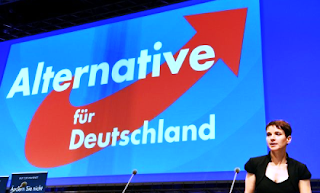The anti-refugee movement in Germany is just a start as it hit new heights early May 2016 after a surging far-right political party made slamming the door on Muslims part of its official platform.
Alternative for Germany (AFD), the nation’s fastest growing political party, announced the formal stance in Stuttgart on 1 May. The AFD also called for a ban on minarets – the mosque towers from which Muslims are called to prayer – and the burqa full-body covering for women. The blatant messaging comes at Chacelor Angela Merkel’s popularity plummets and much of Germany turns against the policies that allowed last year’s influx of more than one million mostly Muslim migrants. Before the refugee crisis, there were 4 million Muslims in Germany.
According to opinion polls, the AFD has the support of up to 14 percent of the German electorate and poses a serious challenge to Merkel’s Christian Democrats and other established parties going into the 2017 federal election.
Far-right parties with agendas similar to that of AFD are springing up throughout Europe, reflecting lack of confidence in the European Union’s ability to deal with the refugee crisis, terrorism and financial problems:
"Anti-immigrant Germans say the Muslims will have more children to make more money," Richard Herzinger, an editor at the German newspaper Die Welt, told FoxNews.com.
There is also the fear that migrants who have no experience with democracy will not be able to adjust to a free society like Germany, ultimately posing a danger to democracy itself.
Lack of confidence in the Brussels-based European Union and the feeling that EU leaders are out of touch with the people also leads to a sense of alienation from its governance say observers.
"This alienation from Brussels makes some Germans yearn for a national party like the AFD that truly represents their own national interests," said Herzinger.
The swing to an anti-establishment party like AFD can also be explained by voter disappointment with the current ruling parties, the Christian Democrats and the Social Democrats.
Longtime supporters of the Christian Democrats feel betrayed by the liberal course of Merkel’s leadership, largely because of her open-door policy toward Muslim refugees.
Alternative for Germany (AFD), the nation’s fastest growing political party, announced the formal stance in Stuttgart on 1 May. The AFD also called for a ban on minarets – the mosque towers from which Muslims are called to prayer – and the burqa full-body covering for women. The blatant messaging comes at Chacelor Angela Merkel’s popularity plummets and much of Germany turns against the policies that allowed last year’s influx of more than one million mostly Muslim migrants. Before the refugee crisis, there were 4 million Muslims in Germany.
According to opinion polls, the AFD has the support of up to 14 percent of the German electorate and poses a serious challenge to Merkel’s Christian Democrats and other established parties going into the 2017 federal election.
Far-right parties with agendas similar to that of AFD are springing up throughout Europe, reflecting lack of confidence in the European Union’s ability to deal with the refugee crisis, terrorism and financial problems:
- The National Front in France has become one of France’s strongest political forces
- The Danish People’s Party recently gained 21.1 percent of the vote
- Hungary’s far-right Fidesz Party has been in power since 2010
- Austria’s Freedom Party has made dramatic gains
"Anti-immigrant Germans say the Muslims will have more children to make more money," Richard Herzinger, an editor at the German newspaper Die Welt, told FoxNews.com.
There is also the fear that migrants who have no experience with democracy will not be able to adjust to a free society like Germany, ultimately posing a danger to democracy itself.
Lack of confidence in the Brussels-based European Union and the feeling that EU leaders are out of touch with the people also leads to a sense of alienation from its governance say observers.
"This alienation from Brussels makes some Germans yearn for a national party like the AFD that truly represents their own national interests," said Herzinger.
The swing to an anti-establishment party like AFD can also be explained by voter disappointment with the current ruling parties, the Christian Democrats and the Social Democrats.
Longtime supporters of the Christian Democrats feel betrayed by the liberal course of Merkel’s leadership, largely because of her open-door policy toward Muslim refugees.

